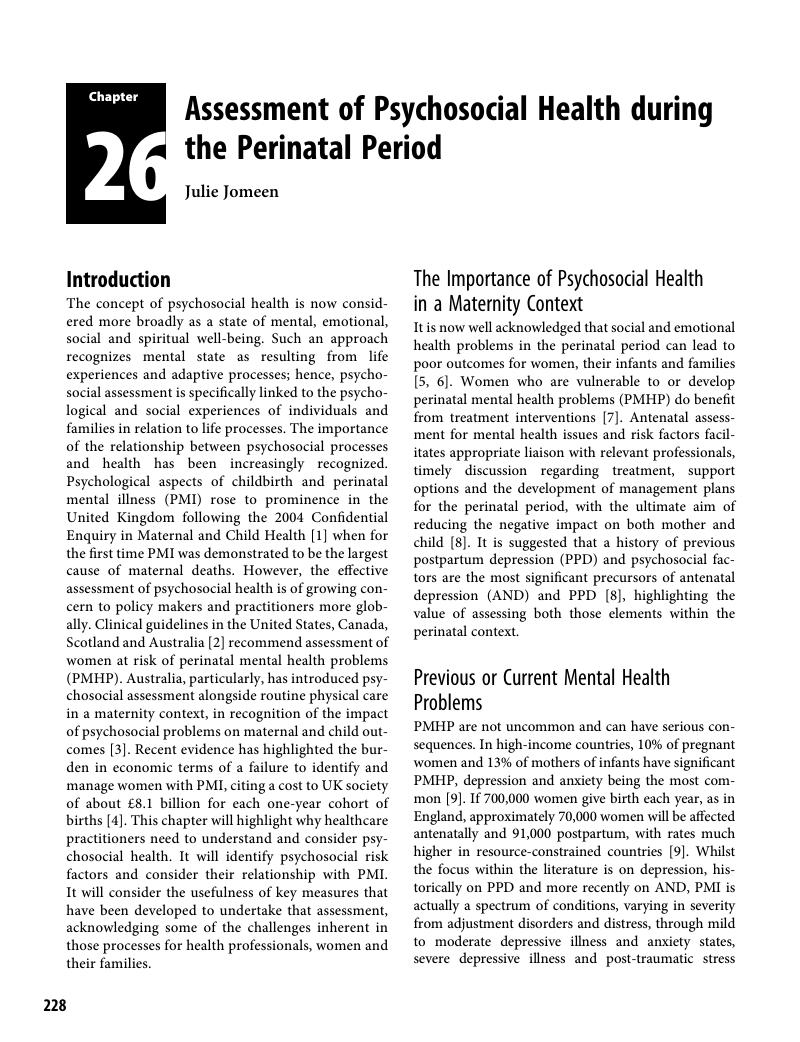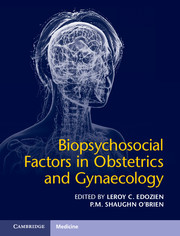Book contents
- Biopsychosocial Factors in Obstetrics and Gynaecology
- Biopsychosocial Factors in Obstetrics and Gynaecology
- Copyright page
- Dedication
- Contents
- Contributors
- Preface
- Section 1 Generic Issues
- Section 2 Gynaecology
- Section 3 Sexual and Reproductive Health
- Section 4 Obstetrics and Maternal Health
- Chapter 25 The Psychobiology of Birth
- Chapter 26 Assessment of Psychosocial Health during the Perinatal Period
- Chapter 27 Biopsychosocial Factors in Prenatal Screening and Diagnosis for Fetal Anomaly
- Chapter 28 The Maternal–Fetal Relationship
- Chapter 29 Reproductive Health Care for Women with Psychosocial Issues
- Chapter 30 Maternal Psychosocial Distress
- Chapter 31 The Effects of Stress on Pregnancy: A Not-So-Evident Association Revisited
- Chapter 32 Biopsychosocial Approach to the Management of Drug and Alcohol Use in Pregnancy
- Chapter 33 Biopsychosocial Factors in Preterm Labor and Delivery
- Chapter 34 Tokophobia
- Chapter 35 Psychiatric Disorders in Pregnancy and Lactation
- Chapter 36 Psychotherapy in Pregnancy and Following Birth
- Chapter 37 Biopsychosocial Factors in Intrapartum Care
- Chapter 38 Biopsychosocial Factors in Postnatal Care
- Chapter 39 Birth Trauma and Post-Traumatic Stress
- Chapter 40 Vicarious Traumatization in Maternity Care Providers
- Chapter 41 Biopsychosocial Care after the Loss of a Baby
- Appendix: RCOG Checklist of Hints and Tips to Support Clinical Practice in the Management of Gender-Based Violence
- Index
- References
Chapter 26 - Assessment of Psychosocial Health during the Perinatal Period
from Section 4 - Obstetrics and Maternal Health
Published online by Cambridge University Press: 30 August 2017
- Biopsychosocial Factors in Obstetrics and Gynaecology
- Biopsychosocial Factors in Obstetrics and Gynaecology
- Copyright page
- Dedication
- Contents
- Contributors
- Preface
- Section 1 Generic Issues
- Section 2 Gynaecology
- Section 3 Sexual and Reproductive Health
- Section 4 Obstetrics and Maternal Health
- Chapter 25 The Psychobiology of Birth
- Chapter 26 Assessment of Psychosocial Health during the Perinatal Period
- Chapter 27 Biopsychosocial Factors in Prenatal Screening and Diagnosis for Fetal Anomaly
- Chapter 28 The Maternal–Fetal Relationship
- Chapter 29 Reproductive Health Care for Women with Psychosocial Issues
- Chapter 30 Maternal Psychosocial Distress
- Chapter 31 The Effects of Stress on Pregnancy: A Not-So-Evident Association Revisited
- Chapter 32 Biopsychosocial Approach to the Management of Drug and Alcohol Use in Pregnancy
- Chapter 33 Biopsychosocial Factors in Preterm Labor and Delivery
- Chapter 34 Tokophobia
- Chapter 35 Psychiatric Disorders in Pregnancy and Lactation
- Chapter 36 Psychotherapy in Pregnancy and Following Birth
- Chapter 37 Biopsychosocial Factors in Intrapartum Care
- Chapter 38 Biopsychosocial Factors in Postnatal Care
- Chapter 39 Birth Trauma and Post-Traumatic Stress
- Chapter 40 Vicarious Traumatization in Maternity Care Providers
- Chapter 41 Biopsychosocial Care after the Loss of a Baby
- Appendix: RCOG Checklist of Hints and Tips to Support Clinical Practice in the Management of Gender-Based Violence
- Index
- References
Summary

- Type
- Chapter
- Information
- Biopsychosocial Factors in Obstetrics and Gynaecology , pp. 228 - 236Publisher: Cambridge University PressPrint publication year: 2017



